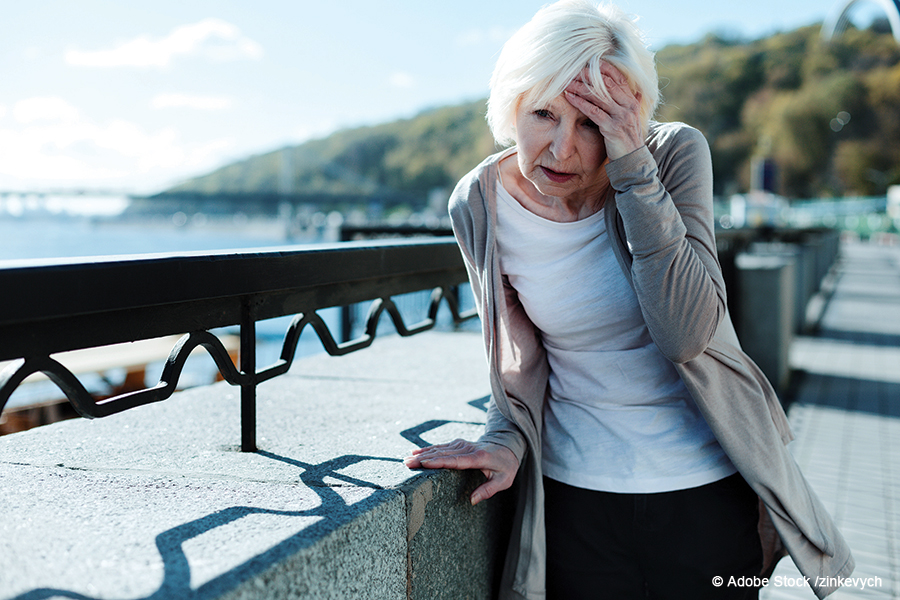 Daytime somnolence and sleep apnea are associated with dizziness in the elderly, according to new findings presented at the Triological Society Combined Sections Meeting. The study results, which come from a review of data from a large national database, show that these conditions have an independent link to dizziness apart from the many overlapping comorbidities that are often seen in an older population, said Betsy Szeto, MD, MPH, a third-year otolaryngology resident at the University of Virginia in Charlottesville.
Daytime somnolence and sleep apnea are associated with dizziness in the elderly, according to new findings presented at the Triological Society Combined Sections Meeting. The study results, which come from a review of data from a large national database, show that these conditions have an independent link to dizziness apart from the many overlapping comorbidities that are often seen in an older population, said Betsy Szeto, MD, MPH, a third-year otolaryngology resident at the University of Virginia in Charlottesville.
Explore This Issue
April 2024“Dizziness and vertigo are common in the elderly, and the underlying cause is complex and multifactorial,” she said.
For the study, researchers used data from the National Health and Nutrition Examination Survey (NHANES) from 2017 to 2020, with dizziness as the main outcome and daytime somnolence, snoring, and apnea as the main exposures. The average age among the 1,490 patients was 76 years.
Researchers divided the daytime somnolence survey responses into less than five times per month or five or more times per month; the snoring responses into less than five nights per week or five or more nights per week; and the apnea responses into never or at least one night per week. They also analyzed many other variables and medical comorbidities as possible covariates, including gender, age, body mass index (BMI), history of stroke, history of congestive heart failure, and history of chronic obstructive pulmonary disease (COPD).
They found that females reported dizziness significantly more often than males—44.7% of the time compared to 34.9%, respectively (P < 0.01). Additionally, a BMI of higher than 35 was associated with significantly more dizziness than a BMI of 35 or lower —48.1% to 39.0%, respectively (P < 0.04).
Those patients who had greater daytime somnolence, listed in the five or more times per month category, were more likely to report dizziness compared to those listed in the less than five times per month category—56.2% vs. 34.9%, respectively (P < 0.01). And those who experienced apnea at least one night per week were more likely to report dizziness compared to those not reporting apnea at all—51.2% vs. 36.7%, respectively (P < 0.01). Snoring was not found to be associated with dizziness.
Congestive heart failure, stroke history, thyroid problems, COPD, diabetes, and hypertension were all found to be significantly associated with dizziness, as well. But when researchers used a multivariable logistic regression model, they found daytime somnolence to be independently associated with dizziness, doubling the odds that someone would experience dizziness (OR = 2.13). They also found apnea to be independently associated, bringing a 65% increased chance that someone would experience dizziness (OR = 1.65), Dr. Szeto said.
Despite adjusting for medical comorbidities, we did find that apnea and daytime somnolence are independently associated with dizziness. — Betsy Szeto, MD, MPH
“Daytime somnolence and apnea are both associated with increased odds of dizziness even with adjusting for medical comorbidities, although we did not show a significant association between snoring and dizziness,” she said. “Despite adjusting for these medical comorbidities, we did find that apnea and daytime somnolence are independently associated with dizziness.”
She acknowledged that the questionnaire basis for the study means that there could be recall bias at play and that because the study is cross-sectional, no causality could be established. But because of the study’s large sample size, researchers were able to control for multiple comorbidities and assess a sample that was community based and nationally representative, she said.
“The next steps we’d be interested in,” Dr. Szeto noted, “are prospective studies to confirm this relationship and then asking the question of whether optimizing sleep can help reduce symptoms of dizziness.”
Thomas R. Collins is a freelance medical writer based in Florida.